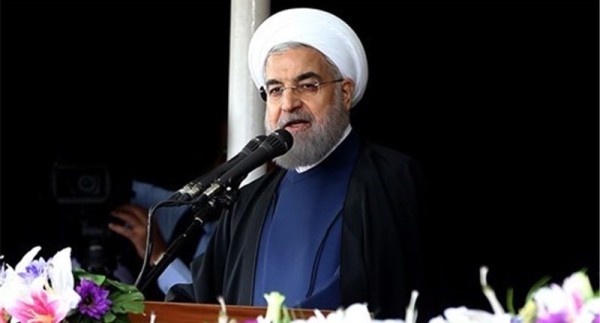Under increasing pressure over his foreign and economic policies, Iran’s President Rouhani has again defended the July 2015 nuclear agreement with the 5+1 Powers.
Rouhani told an audience in northern Iran that the deal, formally implemented in January, was a historic advance for the Islamic Republic:
Some individuals are questioning the JCPOA [Joint Comprehensive Plan of Action], saying what it has done for us. This is while the JCPOA has put on record a political and legal honor in the history of the Iranian nation.
Hardline critics of the deal have never halted their allegations of Government weakness, particularly before the US, but they appeared to have been checked in late February by the success of the centrist-reformist bloc, allied to Rouhani, in elections for Parliament and the Assembly of Experts.
However, the Supreme Leader boosted the criticism with his rejection last month of Rouhani’s declaration the the “JCPOA” should be followed by a “JCPOA 2” for post-sanctions economic recovery.
Ayatollah Khamenei said there should be no talk of a “JCPOA 2, JCPOA 3, or JCPOA 4”, claiming that the US was undermining the deal by its refusal to lift sanctions. Instead, Khamenei called for a “Resistance Economy” of self-sufficiency which is not reliant on cooperation with the West.
The Revolutionary Guards, suspicious of the deal on economic as well as military grounds, used the opening to challenge Rouhani and his allies, including former President Hashemi Rafsanjani.
On National Army Day on Sunday, Rouhani praised Iranian negotiators for diplomatic success that complemented military strength. But at the same time, some MPs were challenging the Government’s presentation of the deal in Parliament, saying the report was “not in accordance with the directives of the Supreme Leader”.
Rouhani replied on Tuesday:
The great Iranian nation made a historical decision. It decided to defeat the Islamophobia and Iranophobia spread by the world powers and international Zionism….
We have almost reached the summit.
Who would have thought that six [UN] Security Council resolutions and 12 resolutions [by the International Atomic Energy Agency’s] Board of Governors would be terminated one after another?
He urged patience as the deal was put into effect, saying that “any destruction needs time” to be rectified, and reminding listeners that agreement “came into force only 3 months ago, not 30 years ago”.
Kerry: Iran Has Received Only $3 Billion from Deal
However, US Secretary John Kerry appeared to undercut Rouhani by saying that Iran has received only a small percentage of its frozen assets following the deal’s implementation.
Kerry told the American Jewish group J Street that Iran has received only $3 billion far.
US critics of the deal said up to $155 billion would be returned to Tehran, while Kerry put the total of assets at $55 billion.
Foreign Secretary Mohammad Javad Zarif said he would press Kerry in a meeting in New York, “It is time to rebuild trust with the institutions which suffered losses from their links with Iran in the past. They have to be given assurances that they will not suffer from such links in the future.”

